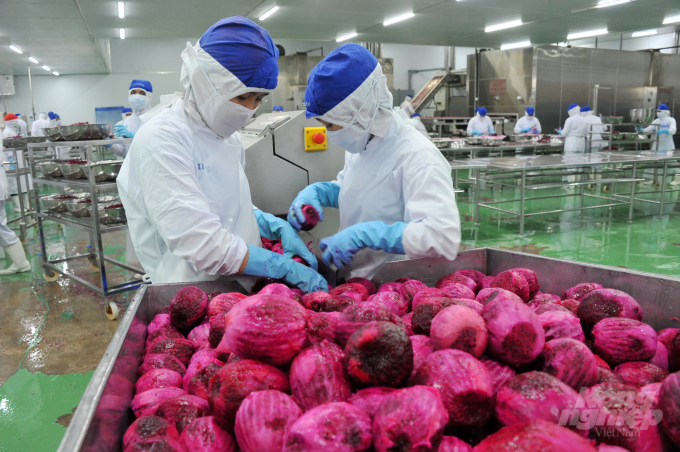November 26, 2025 | 23:52 GMT +7
November 26, 2025 | 23:52 GMT +7
Hotline: 0913.378.918
November 26, 2025 | 23:52 GMT +7
Hotline: 0913.378.918

Vietnamese dragon fruits are inspected more frequently when exported into Europe.
The European Commission (EC) published Regulation (EU) 2021/2246 on December 15 amending Implementing Regulation (EU) 2019/1793 on the contemporaneous adoption of official and urgent control measures on certain agricultural items imported into the EU.
On a certain level: Based on recent EU member inspections of Vietnamese dragon fruits imported into the EU market for pesticide residue contamination, the European Commission decided to raise the frequency of testing for Vietnam's dragon fruit imports to 20% - a 10% increase over the November 15 announcement.
According to the EC, dragon fruit is the only agricultural product that is subjected to a pesticide inspection check increase. Other agricultural items, such as coriander 50 percent, basil 50 percent, mint 50 percent, parsley 50 percent, okra 50 percent, and pepper 50 percent, are permitted to maintain their current inspection frequency.
The EC will review a list of foods and animal feeds of non-animal origin from selected third countries that will be temporarily subject to a temporary tightening of the primary control mechanism at border checkpoints to guarantee food safety over six months.
Vietnamese vegetable production and value exports to the EU have increased in recent years, with an annual growth rate approaching 20%. According to the Vietnam SPS Office, Vietnamese agricultural exports are reaping benefits from the European Union–Vietnam Free Trade Agreement (EVFTA).
Certain items, including passion fruit, longan, lychee, mangosteen, jackfruit, guava, spice vegetables, and sweet potato, rapidly established a foothold in the EU market. However, vegetables and fruits exported to the EU continue to face numerous difficulties and obstacles due to a lack of production synchronization and linkage, a lack of large-scale production areas to ensure both quality and stable supply, and a lack of large-scale production areas to meet export demand.
From January 6, 2022 (the twentieth day after publication in the Official Gazette), the higher inspection frequency for dragon fruits will be a problem for big dragon fruit granaries in Binh Thuan and Long An.
On December 24, the SPS Vietnam Office sent an announcement to the Plant Protection Department (MARD) and the Department of Science and Technology (Ministry of Industry and Trade), requesting that these units strengthen inspection and examination of producers.
"Reviewing the management chain's stages, identifying root causes and proposing corrective actions for Vietnam to seek the EU to rescind the measures specified in Regulation (EU) 2021/2246 in the coming time," the document reads.
Mr. Ngo Xuan Nam, Deputy Director of the SPS Vietnam Office, stated: "If relevant agencies operate aggressively, synchronously, and effectively, the SPS Vietnam Office will propose to the European Commission at the next six-month meeting to lower the frequency."
According to Mr. Nam, the EU market is increasingly focused on importing organic fruit and vegetable goods, adhering to stringent food safety and hygiene requirements, promoting social and environmental responsibility, and respecting corporate ethics.
As a result, a complete strategy for promoting Vietnamese agricultural exports to the EU must be devised, focusing on a new brand positioning for Vietnamese agriculture that is honest, responsible, and sustainable.
Along with dragon fruit, another Vietnamese product, instant noodles, has had its inspection frequency raised by 20%. Along with certain items from China, India, Malaysia, and Turkey, Vietnamese instant noodles may be contaminated with ethylene oxide. This conclusion is based on the RASFF system's message count.
Translated by Linh Linh

(VAN) The Mekong River Commission adopts the 2026 - 2030 Strategic Plan with a people-centered approach.
/2025/11/26/1720-1-200855_132.jpg)
(VAN) Viet Nam and Japan have many conditions to expand cooperation on climate change adaptation, particularly in disaster risk management based on advanced technologies.

(VAN) The strong development of digital technology and artificial intelligence is opening up opportunities to transform science and technology into a 'Magic eye' for disaster forecasting and early warning.

Applying vaccines and proactive disease prevention helps pig herds stay healthy, maintain productivity, reduce risks, and decrease reliance on antibiotics in modern livestock farming.

(VAN) Many advanced agricultural technologies and products were shared at the Viet Nam - South Korea Agricultural Technology Introduction, Trade Promotion, and Connection Seminar 2025.

(VAN) Minister Tran Duc Thang hopes to strengthen connections and exchanges with China in agriculture and environment sector through the Embassy of Vietnam in Beijing.

(VAN) After 50 years of strategic cooperation, Viet Nam and UNICEF remain committed to promoting fair and inclusive development for all children in the digital future.